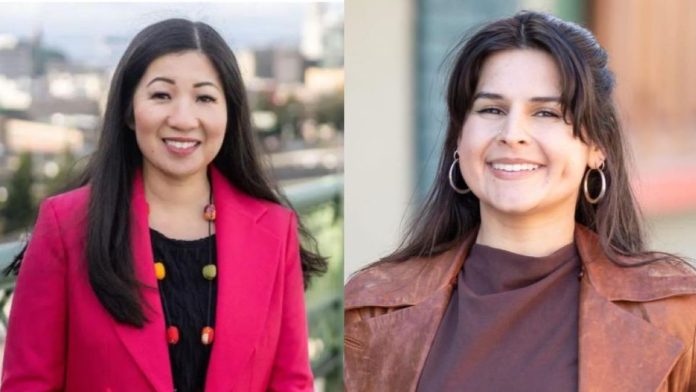
A pro-Woo PAC pumped $70,000 into the race Friday as a last ditch effort to swing the election.
Alexis Mercedes Rinck is the progressive challenger seeking to reduce the centrist majority on Seattle City Council. With a broad range of endorsements including The Urbanist’s, Rinck outperformed centrist appointee Tanya Woo in the primary, gaining more than 50% of the vote, compared to just 38% for Woo. But centrists have enjoyed a large fundraising advantage in recent elections, aided by outside money, which could make the 12-point lead precarious.
This year could be different, though. With the help of a new political action committee (PAC), progressive outraised centrists for much of this race, albeit by a slight margin. It took a last-minute $70,000 buy from “Friends of Seattle” reported Friday to put Woo ahead of Rinck.
The last-minute outside spending surge doesn’t have Rinck worried, since it is the standard playbook for centrists. Plus, it does not hurt that a recent poll showed her with a healthy 24-point lead over Woo.
“We knew all along that special interests were going to distort my record and positions to keep their appointee in office,” Rinck told The Urbanist. “We’re continuing to stay focused on a forward-looking and unifying campaign and we believe Seattle voters will see through the divisive tactics of this cynical late spending.”
Public Disclosure Commission (PDC) filing shows the Rinck campaign neck and neck with Woo, having raised $448,365 to Woo’s $454,566 campaign too.
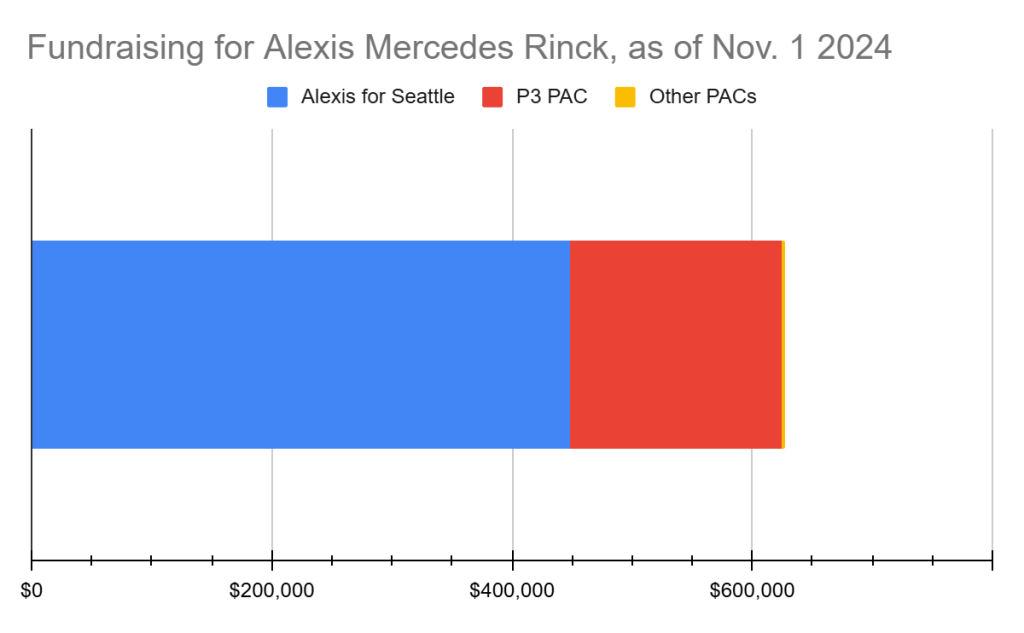
It’s a similar story with independent expenditures by PACs. Progressive PACs have spent $132,292 in support of Rinck, most of it from the Progressive People Power (P3) PAC, a newly launched group chaired by former D3 candidate Ry Armstrong. The P3 board also includes several other left-leaning 2023 Seattle City Council candidates and operatives on its board, such as Efrain Hudnell, who also serves on The Urbanist board. Progressive People Power PAC has also spent $47,117 campaigning against Woo. That’s nearly $177,000 in all.
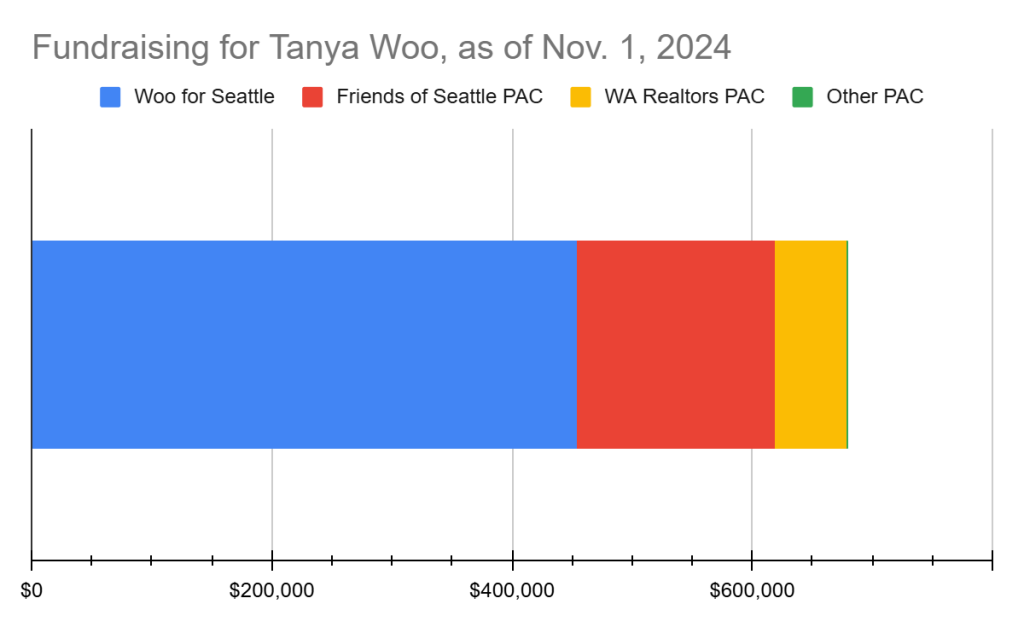
On the other hand, pro-Woo PACs have spent $141,875 backing her, and $81,875 against Rinck. As such, Woo enjoys an advantage of about $47,000 in outside spending, thus far. Overall, Woo enjoys a 8% advantage in fundraising (counting outside spending), which is much lower than centrists have enjoyed in recent elections.
After suffering losses in 2021 and 2023, Seattle progressives view keeping the fundraising battle close as essential to preventing their message from being drowned out. And progressive do believe they have a winning message after the Seattle City Council’s new centrist supermajority has dedicated itself to what they see as doting on the rich, while hurting the poor.
Progressive have pointed to Council’s efforts to weaken minimum wage protections for gig workers and tipped workers, to obstruct new investments in social housing, and block a proposed high earners tax to fund said investments — much to the ire of the mega-donor class.
Centrists are moving to divert affordable housing funds from the JumpStart tax and cut services, rather than raise new revenue to plug a $250 million budget deficit. This will hurt affordable housing production, undermining the intent of the 2020 progressive initiative.
Famously, Amazon tried to buy Seattle’s local elections in 2019, with more than $1.5 million in political contributions. In 2023, business interests got smarter and more subtle by establishing PACs with benign-sounding neighborhood-y nomenclature. Even so, the PACs had the same impact of vastly outraising progressives and pushing the election results in their favor.
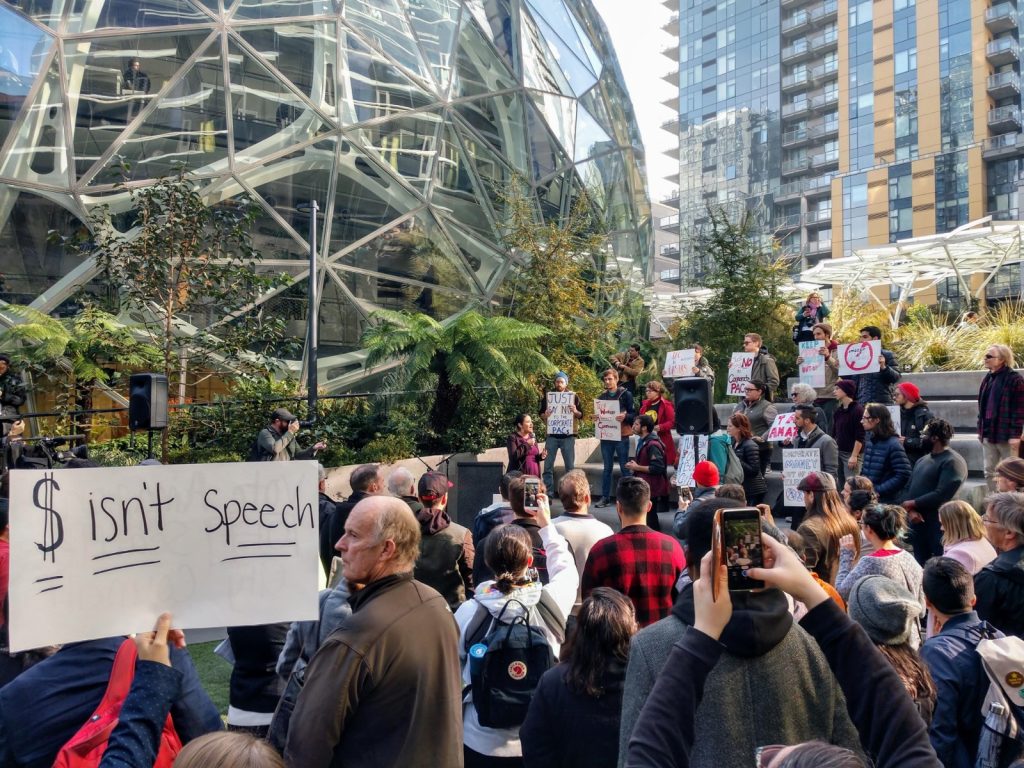
The 2019 Amazon’s money bomb backfired, leading to a progressive supermajority on Council and the 2020 passage of the JumpStart progressive payroll tax on the City’s largest companies, providing resources to weather the pandemic financial disruptions and then invest in affordable housing and the Green New Deal. However, the more diffuse outside spending efforts in subsequent elections were much more effective and swinging outcomes without generating backlash.
For example, in the closest 2023 race, centrists outraised progressives by more than double, likely providing the difference, given Maritza Rivera’s tight 235-vote victory margin over Ron Davis, who was backed by progressive groups including The Urbanist. The degree varied, but all losing progressives were vastly outspent in 2023.
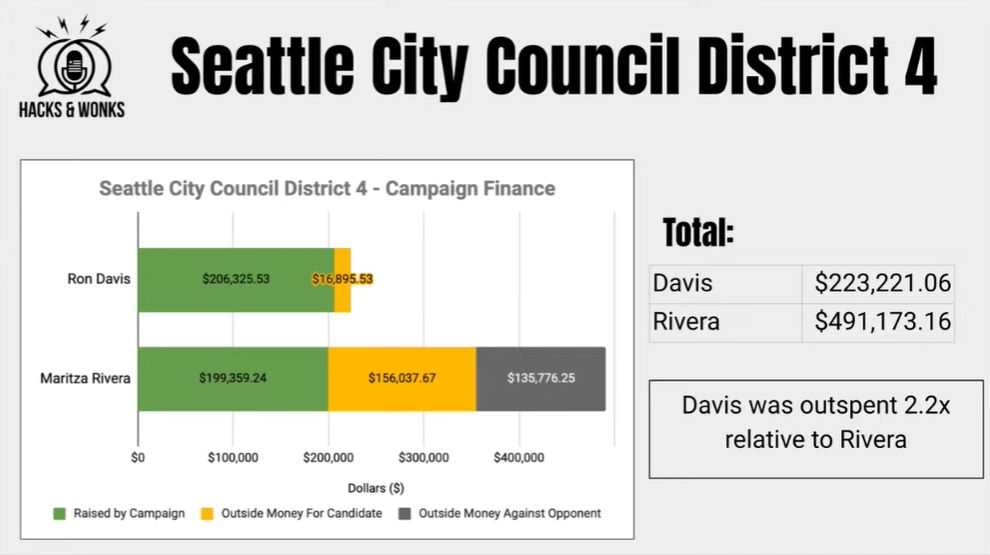
Most candidates have participated in the Democracy Voucher program, but some cycles vouchers are not enough to offset the power of copious outside spendings via PACs.
Seattle pioneered the Democracy Voucher program to blunt the impact of outside spending, but it still very much influences elections. The Supreme Court’s Citizens United ruling guarantees corporations and people the ability to make unlimited campaign contributions to PACs. Public funding has helped democratize local campaigns, attracting new people to run for office and broadening the base of donors to which elected officials inherently pay closer attention. However, unchecked outside spending still makes it possible for monied interests to distort outcomes and put their thumb on the scale.
Campaign finance laws cap individuals at donating $350 to a city council candidate each election cycle. To receive Democracy Vouchers, campaigns must adhere to spending limits, with $450,000 the current cap for the two candidates that advanced out of the primary.
The catch is that outside spending from PACs faces no cap whatsoever, allowing big spending from corporations, hedge-fund managers, or real estate moguls to swamp an election and easily surpass the hard-earned cash campaigns scraped together in small donations and vouchers.
The Democracy Voucher system does offer a safety valve of raising individual spending limits and campaign spending limits once a threshold of outside spending has been hit. That recently happened in the Rinck-Woo race, as both candidates recently had their limits increased.
“Seattle has released our campaign from previous individual contribution limits; the new individual limit is $650.* So, if you previously reached the $350 fundraising cap, you can now donate up to an additional $300,” the Rinck campaign said in an email Thursday. “But, the bad news is that we are only able to do this because our opponent has caught up to us in fundraising.”
Rinck’s team noted that the campaign behind Woo has increasingly gone negative down the stretch, which is a classic way to deploy outside spending, since a candidate can claim they had no hand in the negative messages. By law, PACs are not allowed to coordinate with candidates and their campaign staff.
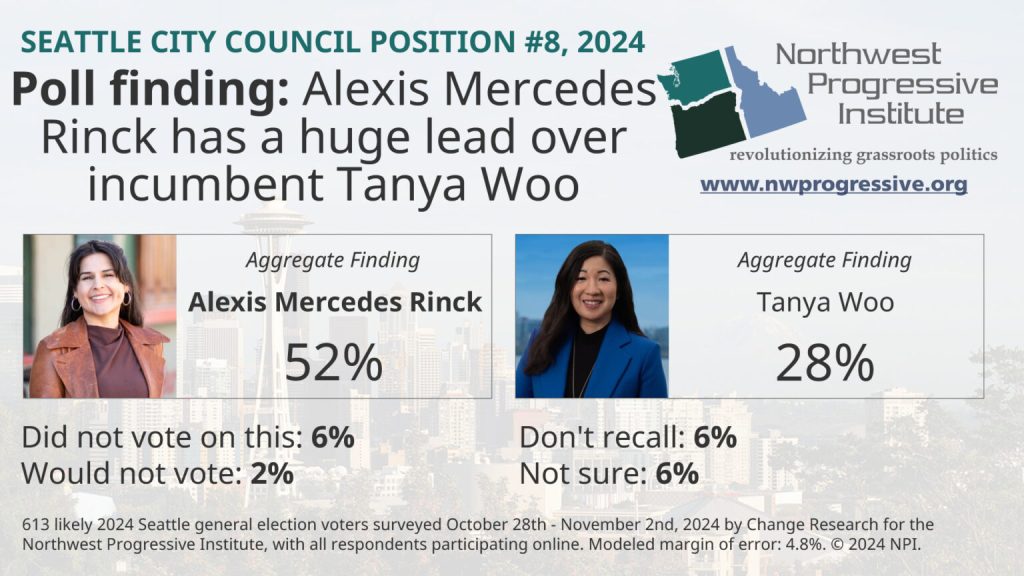
“From the breadth of our endorsements, to the number of democracy vouchers received, we have surpassed our opponent in so many ways,” Rinck wrote in the pitch for donors. “But because of her deep pocket funders she has raised more cash to fuel her increasingly negative campaign. Can you donate today to help us fight back?”
The Progressive People Power PAC has been able to hold surf with the centrist fundraising machine in 2024, granted with just one municipal race on the ballot and a relatively favorable dynamic for progressives that may be suppressing centrist giving. Raising enough resources to contest the mayor’s race and two citywide council seats in 2025 will be a bigger lift for progressive funders.
Centrists seem likely to invest heavily in the re-elections of Mayor Bruce Harrell and Council President Sara Nelson. Losing one seat might have been viewed as a big deal, but Seattle’s biggest players are unlikely to sit out a mayor’s race.
For progressives, a win for Rinck would be positive momentum to build on, but much work would remain to level the playing field and regain control of the Seattle City Council and elect an aligned mayor.
Update: This article was updated at 9:20am Sunday with a fresh Rinck quote.
Doug Trumm is publisher of The Urbanist. An Urbanist writer since 2015, he dreams of pedestrian streets, bus lanes, and a mass-timber building spree to end our housing crisis. He graduated from the Evans School of Public Policy and Governance at the University of Washington in 2019. He lives in Seattle's Fremont neighborhood and loves to explore the city by foot and by bike.

